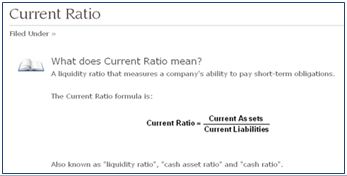How to use Investopedia?

Have you ever felt bogged down by financial jargon or buzz words? If you have answered “Yes”, you are not alone. Many people ranging from laymen to the biggest financial wizards keep updating their knowledge either through books, recent news or other sources.
Investopedia is a largest internet site exclusively for investment education and is a resource for personal finance, market analysis and free trading simulator. Using investopedia will help you understand the meaning of financial terminologies and it’s implications in detail.
In my school or college days I remember using the good old dictionary and most people including my parents used to advise me on using a dictionary whenever I come across new words or terms. The habit of referring a dictionary or a thesaurus was a sure shot way to improve one’s vocabulary and knowledge. But in today’s world the scenario is completely different. You have spell check, dictionary, thesaurus, etc. all available on your desktop computer or the internet.
How many of these can cover all the financial jargon’s and buzzwords? They do cover most of these but not in detail. The only other alternative is to refer Finance text books, which are even more exhaustive and tedious.
What if you had a simple tool like Google which can give you a quick snapshot of some key jargon in Finance? If this is what you are looking for then you must visit www.investopedia.com to see how learning finance/investing can be interesting.
Understanding Financial Jargon using Investopedia
Although one can find the meaning of financial jargon or terms in a regular dictionary or word processor understanding its implications and practical applications is difficult. If you want to know what is ‘current ratio’ and how it works, what are its implications, etc. then the best place to go is Investopedia.com.
The way it works is very simple if you follow the steps below:-
- Go to www.investopedia.com
- Locate the search box which allows you to type a search term or keyword.
- Type the keyword (lets say ‘current ratio’ is the keyword) and click search to get results.
The Results
Assuming your search for ‘current ratio’ on investopedia, the results shown on the website would have the following sections:-
- What does Current Ratio mean? &
- Investopedia explains Current Ratio
- Related Definitions
- Articles of Interest
Section 1 explains the meaning and basic formula. In this case you also save a lot of time which you would otherwise have to incur if you refer a Finance text book. Please see the screen shot below for details.

Section 2 explains ‘current ratio’ in a more detailed fashion, to tell you the inference, application and practical working in the business world.

The screen shot above shows only a part of section 2 to make it concise to fit within the article. The full details in this case consist of three paragraphs out of which the first is shown as a sample.
Section 3 Related Definitions shows a list of terms or jargon that are related to our search term, which is ‘current ratio’. Some of the related terms include
- Acid-Test Ratio
- Cash Asset Ratio
- Current Assets
- Current Liabilities
- Inventory Turnover
- Key Ratio
- Liquidity Ratios
- Obligation
- Receivables
- Working Capital
These terms are closely related to current ratio. For instance current assets and liabilities, which are key components of ‘current ratio’ are also key elements of ‘working capital’.
Section 4 provides more detailed insight and analysis in to various aspects for people who want to analyze and get in to the nitty-gritty areas. This is an excellent resource for finance students, candidates preparing for certification courses, professionals and those with keen interest in finance or investments.

There would be a list of articles under “Articles of Interest” covering various topics related to ‘current ratio’. For instance the first article titled ‘Do Your Investments Have Short-Term Health?’ provides some insight in to some real life situations or scenarios in a separate article. If you click on the link you can read the article in details and use some of the information for future reference.
Advantages
The advantages of using Investopedia are for various users are below:-
- For beginners it helps in understanding jargon in a simple, easy to understand format.
- This portal is a boon for Finance students and professionals who want a ready reference to update their knowledge or revise on certain important concepts.
- Investopedia is not a language dictionary, but a resource like Wikipedia which provides you a lot of practical examples, illustrations and explains the implications
- Most of the features on Investopedia are free to use, but the quality of material is very good.
- Saves time and energy since you can get more knowledge by referring related terms and concepts
- An excellent reference for people who want to prepare for exams or interviews
- Academicians or training professionals can use this information to improvise their study materials and courses
Drawbacks
- Some of the terms could be more suited to American context (i.e. applicable in US). However, Investopedia also tries to provide more generic information in section 1, but examples from US would be commonly used. This is not a major drawback provided you can understand and related it to your own country or market.
- Investopedia.com is not a replacement for your textbook, course materials, etc. It should only be used as an additional reference material, and not as the main source for academic or professional use.
What more can I get from using Investopedia?
What we have seen on Investopedia is only the tip of the iceberg. There are umpteen number of features, which include:
Investing Tutorials
Provides tutorials or notes on important topics in Finance. For example topics like ‘Stock Basics Tutorial’, ‘The Basics of Bonds’, ‘The Greatest Investors’, ‘Ratio Analysis’, etc. This is also divided in to various sections for beginners, experienced investors, etc.
Forex
This is a specialized section for Forex traders.
Simulator
This is a stock trading and portfolio simulators, which gives you a real time experience of trading or investment in a simulated environment.
Exam Prep
This section has a lot of resources for professionals or candidates preparing for CFA (Chartered Financial Analyst) or Series 6/7 and other certification exams.
Educational Financial Videos
This is a must-see section irrespective of whether you are an average Joe or a financial guru. There are plenty of short videos on Financial concepts which are explained in a simple interactive fashion.
If you are tired of reading those large books, spreadsheets and run of the mill news items you must visit Investopedia for a change. Also visit the video on “What are stocks” at the following link Investopedia
If you still think Investopedia is for Finance geeks, you are absolutely wrong. We all use terms such as recession, distress sale, inflation, return on investment, credit score, mortgage rates, etc in our daily lives. Start using Investopedia & broaden your financial understanding.









Leave a Reply